Ping PS2 Online
Tracert killer applications...
When I were a lad [you still are! -ageing Ed], when this 'ere computer video game cacophony were nought but a guilty hobby perpetrated by the bullied and terminally short of friends, we used to play a proper sport: football. Every wet Sunday morning, we'd troop down to the local recreation ground with our parents where we'd meet a bunch of equally terrified youngsters, usually from some far-flung London borough, or Tring, and proceed to waggle the ball about in the mud with them for about 70 minutes, rarely keeping up with it, and pausing occasionally to suck oranges and listen to heated discussions between neighbouring Dads on the touchline about everyone's bright future in the England team.
It was during these fondly remembered days of our young lives that my friends and I first came to terms with a sporting phenomenon: the loudmouthed, overenthusiastic football Dad, whose potentially glittering career in "the game" was aborted in favour of building, low-level management work or milk delivery, by too many lairy beery nights and subsequent greasy fry-ups the morning after; whose venomous, dicky leg-fuelled outbursts at the part-time officials were legendary; and whose son was clearly both the finest player on the pitch and the most important - whatever the scoreline, coaching staff, other players and bored housewives staring out of the windows of their terraced bungalows might reasonably have to say about it.
Touchline squabbling
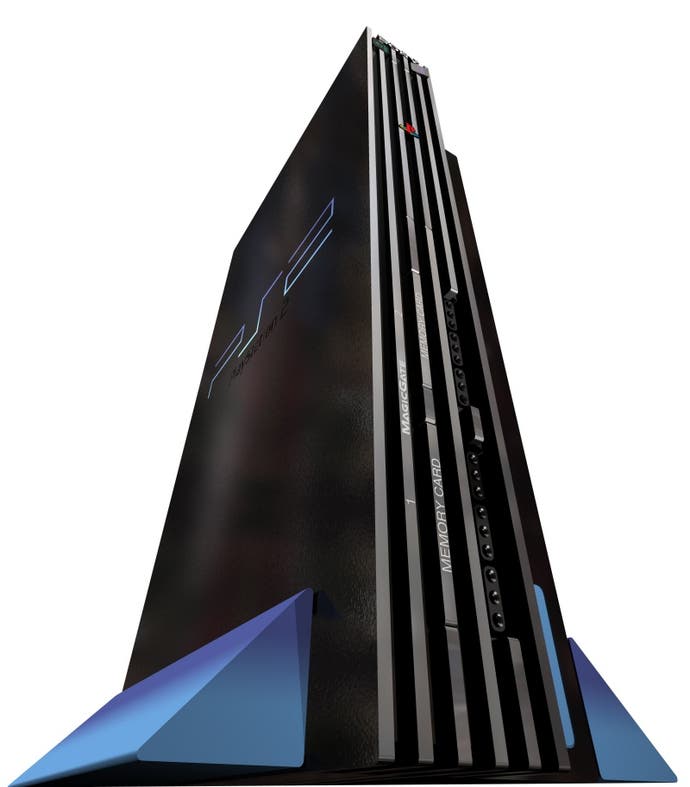
It seems to us that on March 14th 2003, Europe's biggest loudmouthed Dad didn't so much usher his son out through the sidedoor of the milk van and offer some muffled words of encouragement, as thrust his terrified nipper into the spotlights at the Bernabeu and yell "get on with it!" Xbox Live, he told us, wouldn't so much revolutionise gaming as turn the videogame world completely upside down and back to front, with Live emerging as the premier standard for those who like to murder one another with impunity.
So convinced was Daddy Microsoft, that he put more effort into Live than the launch of the console itself, bringing us downloadable updates, a raft of critically acclaimed games, voice communications, and one of the most secure online gaming setups in history, PC or no. According to figures released in April, just 50,000 bought into it across the whole of Europe.
In a way, then, it's understandable that Sony isn't racing to pin its smoothly contoured fonts to the online gaming masthead, preferring instead to launch with a low-key, low-price, subscription-less service and a couple of games which aren't even very good. "Organic growth" is the plan we seem to be hearing about. None of this GM crop Live business.
But that's all very well for the analysts, isn't it? What about those of us pondering £25 on June 11th? Those of us who are spending our own money and not simply directing corporate stock? Well, in short [sweet mercy! -Ed], if it weren't for Rockstar's Midnight Club II, Eurogamer would have lost interest in PS2 Online quicker than loudmouthed Dad at the birth of a daughter during the England versus Argentina...
Sealed with a kiss
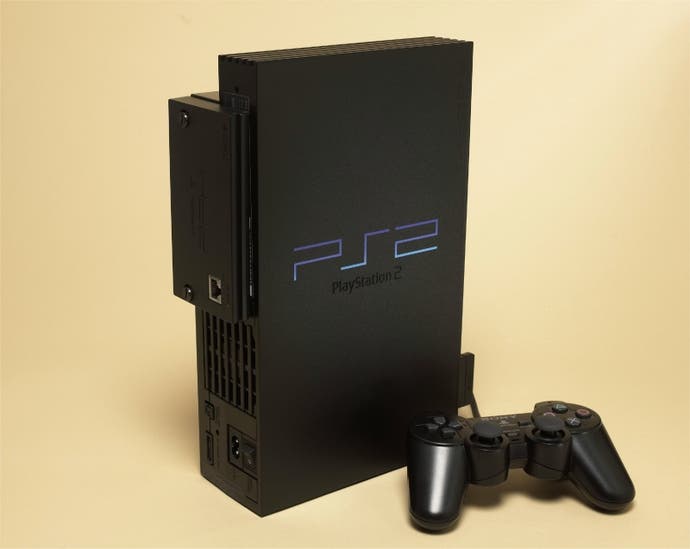
PS2 Online, the package, is a £24.99 Network Adapter, with games in the shape of SOCOM: US Navy SEALs (£49.99 including headset) and Twisted Metal: Black Online (£24.99, or £39.99 including Network Adapter). It's also compatible with Midnight Club II and (we think) Tony Hawk's Pro Skater 4. Apart from gaming, you can also log in to "Central Station" to check on scores, news and the amusingly backward-arsed Dreamcast-esque web-browsing experience.
Way back when, the first time anybody got to go online with Sony (apart from Tony Hawk modem users) was at the end of March when a public beta test of third person tactical shoot 'em up SOCOM: US Navy SEALs was sent out - along with Network Adapters - to anybody willing to part with £50 and a few choice details about themselves. As it turned out though, the network code on the SOCOM disc itself was more important than the hardware or any hashed out numbers, Network Access Disks or credit card details. Armed with this knowledge, three of us got online recently with a retail copy of Midnight Club II, a US Network Adapter and no official sanction to do so whatsoever. We only have one official PS2 Online kit so far...
What we were to discover is that instead of building a Live-style environment full of ingenious security schemes, and locking the service to a single PS2, Sony's beta service basically worked any way you wanted it. As long as you know which numbers to plug into the network setting panel to get yourself onto a home broadband network, you can pretty much take it wherever you like - and that obviously has to, and is, set to change.
By this time tomorrow, the service will be live, and allegedly bound to a PS2 and memory card by a couple of arbitrary numbers (and your console's own serial), rather like Xbox Live is to an Xbox console, Sega's Phantasy Star Online titles were to a Dreamcast, and Kurt Russell's erstwhile polar mates were to The Thing. Once hooked up, you can have up to four identities on a given system, so your flatmates can no longer muddy your statistical superiority, and presumably you can hide your initial shortcomings behind some sort of sparring username...
Plug and play?
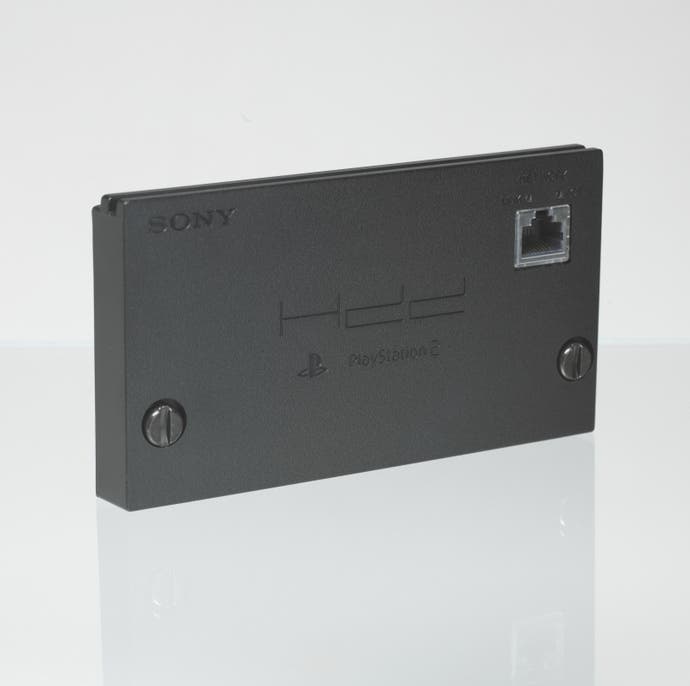
Setting up the console should remain a proverbial piece of piss for anybody with an ounce of network savvy [not me then -beleaguered, confused Ed], and a relative breeze for anybody else. Hardware-wise, all that you have to do is yank free the plastic and metal chassis guard chunk from the back of the console, taking note of the console serial number as you do, and then slap the Network Adapter on the back. You can even tighten a couple of screws if you feel the need. And if you can't guess for yourself, the big hollow bit inside the PS2, and the unused connectors on the bottom half of the adapter will house and connect to the hard disk when Sony finally gets round to releasing that. We reckon it probably works with any old hard drive, but unless you know what sort of partitions and data these have on them, the unused protrusions on the Network Adapter remain quite impotent.
On the software side, all you have to do is stick in the Network Access Disk supplied with the console - or navigate to the manual network set-up options in SOCOM, Twisted Metal: Black Online or Midnight Club II - and go through a step-by-step set-up procedure.
Depending on whether you're connecting it directly to a DSL modem via ISP-supplied dongle, to a cable modem or NTL/Telewest set-top box, or plugging it directly into a hub or switch to act as an Internet Connection Sharing (ICS) client, the procedure differs slightly, but as with Xbox Live every base seems to be covered, and even if you're a network dunce [that's me - Ed], you can expect to get it hooked up via Sony's waiting gaggle of flow chart toting support bods, or - if you're with Telewest, NTL, BT Openworld/Retail or Freeserve - ISP-based support folk.
And if you're lucky enough to know somebody with network bonce, phone them and ask - as long as they understand there's nothing particularly proprietary at work besides the interface and serial number input, they won't have much to worry about in instructing you.
Indeed, network virgins, if you have a network card left over in your PC from a LAN party or something like that, just pop along to your local PC shop on your way home from buying a Network Adapter and demand a decent length of "crossover cable", then link your PC to your PS2 Network Adapter directly. This way all you have to do is check the "share connection" properties box in Windows Dial-up Networking, and tell the PS2 to auto-detect settings. Worked for me, folks.
On the whole, PS2 Online is as easy to set up as Xbox Live. But with so many different broadband configurations out there, it's more or less impossible for Sony or Microsoft to come up with a default option that fits every bill.
The importance of directness
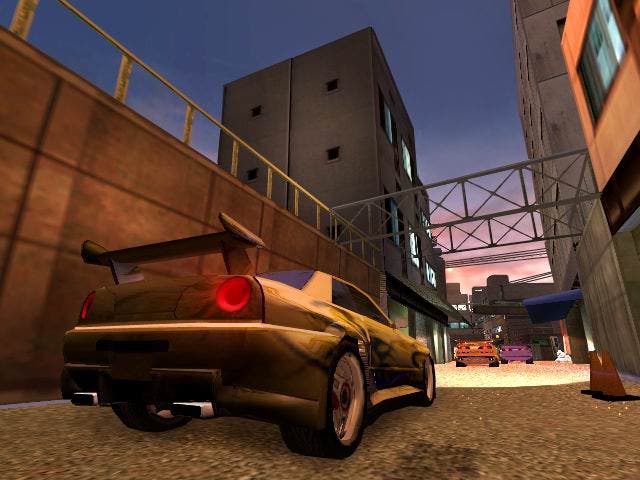
However, the question of whether you're directly connected - with a real, addressable IP address via business ADSL or cable modem - and not simply connected to the same network as a broadband connection, will dictate the level of interactivity you'll be able to enjoy. Although you'll be okay with games like SOCOM, which can host up to 16 players and have their own, dedicated, round the clock servers installed in some rackmount storage facility in London, any game which requires you to host a game yourself or connect to another player's game - peer-to-peer, if you like - can create problems.
Midnight Club II is a good example. Last week, EG's racing trio of Kristan, Rupert and yours truly endeavoured to engage in a bit of three-way. Having somewhat unexpectedly hosted and been hosted by Kristan the previous night, with both of our computers oddly connected via ICS, it seemed perfectly reasonable to expect success. Sitting behind the office network, I set up a game, and Kristan joined successfully. Brrring! Brrring! "It doesn't work," a gloomy-sounding Rupert muttered from my phone's earpiece.
What followed was a number of tests, a lot of mobile phone calls and a bit of cheeky ignoring ringing phones during unplanned duels. As it turned out, if Kristan hosted a game from behind his home network with an IP which cannot be addressed from the outside world (and no ports mapped either, for anybody wondering), I could hook myself in, and Rupert could hook himself in, but though Kristan could see us both, we couldn't see each other, and after a while Rupert's PS2 disconnected and gave up.
The answer was of course to give at least one machine a real IP address. As soon as I had thrown Martin's office computer out of the window and assumed his web identity, both chaps could happily connect to me. It seems that if you want to play with a couple of others, at least one of you needs to be directly connected. And MC2 doesn't support voice comms either, so make sure you have a phone handy. Despite a bit of standard-defying peer-to-peer gaming with the boss, multiple-player racing pretty much requires an actual connection.
In the Navy!
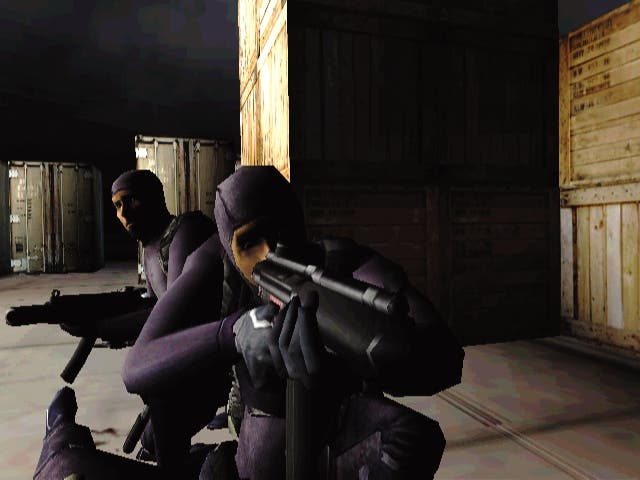
But enough of this boring network set-up drivel, let's talk about the games! We'll be reviewing SOCOM and Twisted Metal: Black Online after a bit of time with the final retail versions, but we have of course been shooting people for a while using the trial releases.
At the top of the first party bill is, as we've said, Zipper Interactive's SOCOM: US Navy SEALs. This costs £49.99, and comes with a Logitech-made, SOCOM-branded USB headset rather like the Xbox Live Communicator. Once wrenched from the package, you plug the USB bit into one of the corresponding ports on the PS2, and stick it on your head. The mouthpiece is reversible, so you can even choose which cheek bears the honour of mic.
We've already covered the game in a certain amount of detail, so head here for an insight into the single player game and game engine, as we're more concerned with the online game here.
As you may already know, the online side of the game is split into various "Briefing Rooms", which correspond to different pockets of resistance all over the world, with a UK room, lots of US-based rooms and plenty of European areas, and through this game browser you can see what sort of game is being played, what your ping is like (with green blobs indicating a good connection), whether friendly fire is enabled (no goddamn comment), and how many players are involved. As with Xbox Live's Optimatch, there's an option to plug in the sort of parameters you're looking for, and get a filtered list of appropriate games.
Console Counter
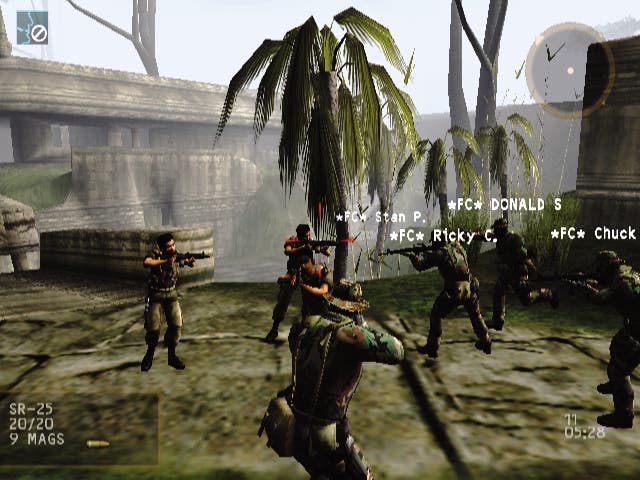
The three gametypes on offer are Demolition, Extraction and Suppression, marked as bomb, cage and gun icons in the online browser. In Demolition mode, the team has to locate the bomb and then shepherd the carrier to an enemy stronghold, protecting the device once planted until it explodes. Then there's Extraction, where you have to retain control of, or escort to safety, a group of gormless hostages trapped in the line of fire, and it's in neither team's interest for them to die. Last of all there's Suppression, which is straightforward team deathmatch.
Stop jumping up and down, Counter-Strike fans, we know it's a rip-off. It may be a third person game with all sorts of crazy grenades and other military paraphernalia, but there's no escaping the fact of the matter: SOCOM wants to be CS on a console.
Except... it's not. CS was the ultimate twitch kill game, requiring deadly precision with the mouse, concerted teamplay and a thorough knowledge of each weapon and map to succeed. SOCOM merely requires teamplay, and a limited knowledge of each map, garnered quickly enough after a round or two. Of course if you can whip the barrel of your M4A1 round with the right analogue stick quicker than your opponent, then you're at an advantage, but as with a lot of console FPS games - something that SOCOM is if you tap 'up' on the D-pad - it's seemingly more to do with strafing a target into your sights than wielding the right stick with any sort of authority. And if you happen to be with a team-mate when you happen upon some poor unfortunate from the opposing team, someone's going to die somehow.
Of course what we have at the moment is lots of people struggling to come to terms with the game environment, yelling at each other through their new headsets and generally failing to grasp the fundamentals. Give it a week though and things will probably settle down, people will start to learn the maps, teams and makeshift clans will emerge, and SOCOM online will take its true shape - and we don't plan to offer our final verdict on the game until we can see how it stands up to good few hours a night until then.
Satanic because it wants to be
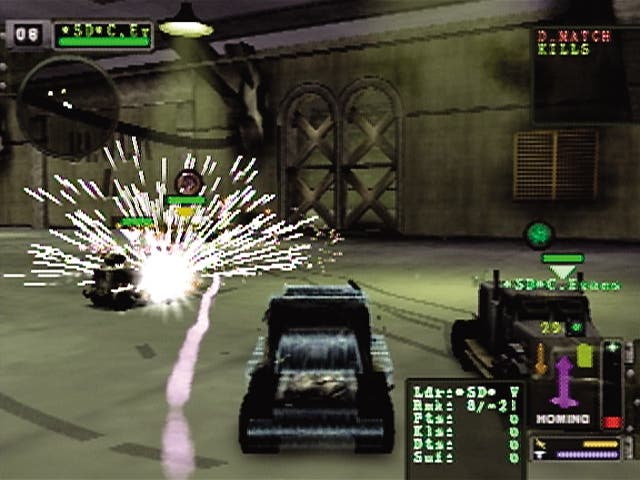
When we first played Twisted Metal: Black, back at the beginning of last year, it seemed to be a really good console-based stab at Carmageddon. Ignoring the wannabe goth overture, with skulls, demonic clown faces and Incog's bleak appreciation of the future, it was actually jolly good fun, even in lasting doses. Playing TM:B Online, however, is like meeting up with an old girlfriend only to have your eyes poked out and your wallet nicked. Why on earth would somebody you were so intimate with treat you with such disdain? And why did you go out with her in the first place? She seems downright ugly now.
The main problem, it seems, is that TM:B Online just isn't a good online game. Whether you're playing against bots or humans, the effect is much the same. You drive around fighting the awkwardly nippy acceleration, firing machine guns with R2 and all sorts of rockets with L2, and occasionally someone dies. However due to the sheer size of the levels and the speed everyone rockets around at, it's difficult to appreciate, let alone implement, good tactics, and with a total lack of voice communications and scant few interesting game modes, it's only a matter of time before you get bored and give up.
The other problem, at least for us, is that nobody save for a clutch of seemingly inebriated journalists is playing it at the moment, as unlike SOCOM and Midnight Club II, nobody can buy this just yet. And, even though it's got 20 maps and a similar amount of "madcap" vehicles, we wouldn't recommend anyone does. It was free in the US, remember! However, should you do so, you'll probably run into us this week - we're planning to give TM:B Online a proper going over very soon. Just to see if it has any value as one of just three PS2 Online titles at the time of writing...
Join the Club!
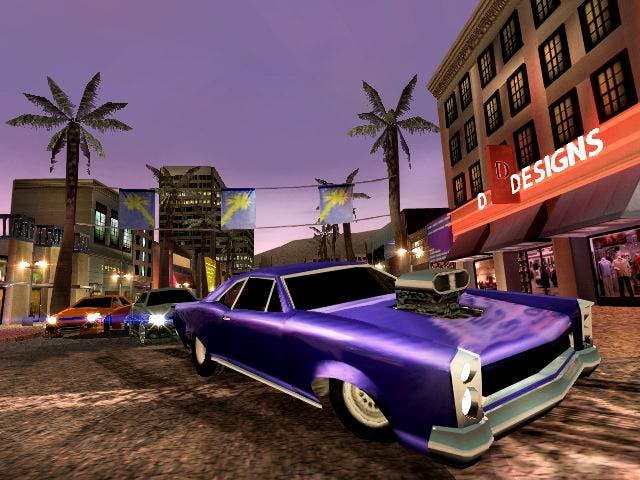
Unlike Twisted Metal, Midnight Club II couldn't be more at home in an online environment. As Kristan noted at some length, the game is an absolute masterpiece of twitch racing, a beautiful mixture of Burnout 2-esque speed and Midtown-style free-roaming checkpoint racing. With lots more besides. Online, you can host or join in with a free-roaming mode (which is a bit pointless, actually), Capture The Flag-style modes and circuit racing. And that's it, apart from a few host options like the ability to boot people out and set the number of flag drops in CTF. It's no more complex. Circuit racing is easily our favourite bit, and like the single player equivalent, you spend each race tearing around the city keeping a close eye on your mini-map, which shows you the current checkpoint and the next one, giving you an idea of which tangent to go off on next. Each track layout (and there are several per city) often has a shortcut or two, like a series of ramps that takes you crashing over rooftops and has you busting out of wire mesh ahead of the competition, and you can guarantee that, given the length and windy roads, more than one person will make a mistake during the course of a race, which makes for some interesting races...
Alas though, we have a couple of complaints. First of all, why in the name of the narrow-chinned Maria does this not support SOCOM's headset? As far as we know there are plans to do so in other games, so why not Midnight Club II? The online racing is truly excellent but it's crying out for a bit of verbal incitement. Spending 30 seconds fumbling for some sort of crude insult using the on-screen keyboard is an activity conceived in hell, particularly since the host can skip the entire group to the next race as soon as he or she likes - almost certainly before you can blurt anything more effective than "u sck". Who cares if it supports a USB keyboard? Who's going to buy one, or even unplug their PC version, just to throw limited abuse at talentless strangers? The lack of voice comms means that the best game on PS2 Online at the moment is better on Xbox Live.
The other irritation is that - as with a number of online console games on both systems so far - you can't play online with cities and cars you haven't unlocked in the single player game. This means that when you tear the shrink-wrap from Midnight Club II for the first time and dive into an online game, your particular brand of hot rod is about as fast as a Robin Reliant with a puncture, whilst everyone else is tearing around in cars with burnout, boost and bouncy suspension, not to mention the ability to right themselves mid-jump. Unless you put in the hours in single player, you've got about five tracks to go for. And these will most likely prove popular for a few weeks, then lose all popularity. Some people may never even get to Paris or Tokyo. It's a crime.
Is it raining?
Although we won't know if PS2 Network Adapters are flying off the shelves for a while, it's clear that the early games don't really do the technology justice. Twisted Metal: Black Online is the weakest online game of all, and we're not surprised it came free with the US package - it isn't worth your money, a point we plan to elaborate on soon with a full review. SOCOM, meanwhile, is something of an enigma. Although it's quite playable and threatens to offer some engaging teamplay, we feel like we're playing it because there's no better alternative, and certainly if we had Ghost Recon to be getting on with we'd be a lot happier.
So, as we said at the top and bottom of this feature, it all comes down to Midnight Club II. And as much as we love it, and it is the sort of game we bought our Network Adapters for, the Xbox version is going to be better looking, and it's going to have the much needed voice communication absent from the PS2 release.
If PS2 Online is going to succeed then it needs killer applications. Perhaps, as Microsoft is learning, the problem is that punters don't know what they want to do with online console gaming just yet.

